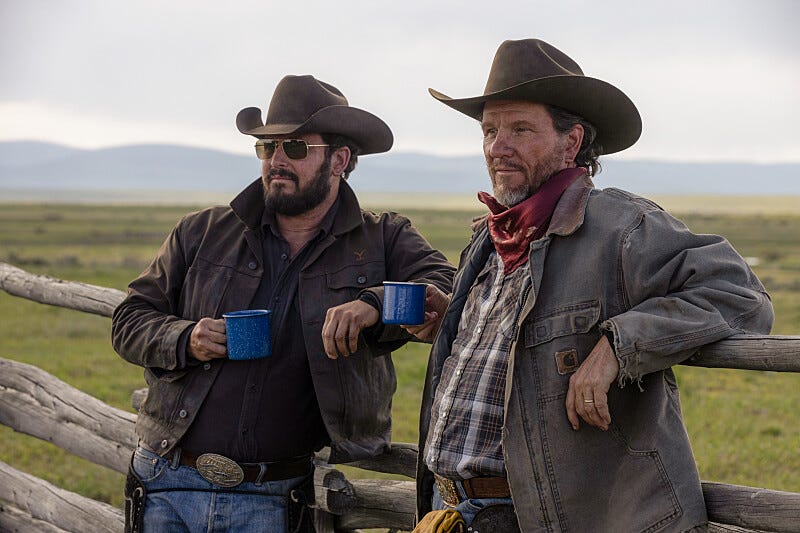I'm old enough to have rituals. My morning coffee preparation, a four-minute process involving a measuring cup, microwave, schmancy coffee grinder, and decidedly not-schmancy Aeropress, is one. Reading the morning paper while still lolling in bed is another.
The standout for me in today's edition was Rich Lowry's deconstruction of one more leftist freakout over the TV show Yellowstone.
Now in its fifth season, Yellowstone is about a family of ranchers in Montana, owners of a tract of land the size of Rhode Island, and the various parties who want to pry it from their hands. Cold and dead, if that's what it takes. It's quite entertaining, it's a very refreshing alternative to the checklist-woke fare that dominates our viewing options... and it's soap-opera bug-nutty in its excess. It's so popular that its show runner, Taylor Sheridan, has been given opportunity to create a fistful of other product, including prequels, spinoffs, and stand-alones.
Its popularity despite its relative lack of woke (relative, mind you...) offends the Left's harridans, and they want to make sure you are aware they are not amused. So, of course, in prototypal golden-shoehorn fashion, they overlay their narratives (always scolding, always negative) onto the show
The latest, as Lowry detailed, is that the show is all about 'white grievance.' Park that phrase in a corner of your mind, because it's going to be the next Big Thing talked about by our Best-and-Brighest.
However, that's not what clanged the blog bell this morning. Rather, it's Lowry's tepid defense of capitalism in his critique.
Lowry is correct in that the show's heroes, such as they are, are more populist than capitalist. The patriarch and lead of the show embraces a nostalgic affinity for what he might dub a fading time, fading lifestyle, and fading value set. The "capitalists" setting against him want to develop the land, to build hotels, resorts, casinos, airports, housing developments, and other such, which would in turn bring non-Montanans into the area, which would dilute and possibly even eradicate the locals' ways.
Here's the problem: Those "capitalists" are perfectly fine with using not only the coercive power of government, but actual violence and other forms of criminality to achieve their ends.
Guess what?
That ain't capitalism.
Cynics and gotchers might immediately retort with an accusation of a No True Scotsman fallacy, but before y'all do, please consider where in the definition of capitalism you find criminal infringement of others' personal and property rights, or the acceptability of leveraging government's coercive power for personal benefit.
Setting aside the criminality and violence, it is true that all parties in the show seek to use the legal system and the complex sheaf of laws on the books to their advantage. Which brings to mind this observation:
Individuals acting within a system should use the rules to their best advantage and benefit. It is the rules, not the actors, that name the system, and one that strays from the fundamental protections for individual and property rights, free association and voluntary exchange, should not be mislabeled, nor should its faults be blamed on the misapplied label.
Capitalism is not utopian. It does not produce perfect results.
It's OK to say that, because it produces better results than any of the other systems humans have developed to date to govern their societies.
By far.
And that's enough to warrant a full-throated defense, rather than perpetuation of the false conflation of corporatism and criminality with capitalism. Lowry should know better.
Don't be ashamed of supporting capitalism, or liberty itself (the former being a subset of the latter). Don't concede that bad actors within capitalism are a failure of the system. That's a nirvana fallacy, because such actors will exist in any system, and history has shown us that the more (real, liberty-based, government protecting individual and property rights) capitalism we have, the stronger the protections against those bad actors. It's when they have access to a large and powerful government that they can wreak the most havoc. Whether that's a corporatist, fascist, socialist, or communist system, the conclusion is the same.
John Dutton, the protagonist of Yellowstone, both is and isn't a capitalist. He wants to make a living off his property, and be left alone in his toil. He is not, however, above using the power of big and intrusive government to get his way. The show presents such moves as defensive and necessary, which is why he's the hero rather than the villain, but overall the show isn't about capitalism triumphing (or destroying, either, no matter the representation of the corporate types as ‘capitalists.’). Nor is it about white grievance, no matter that some want to make it about that. Lowry is correct in putting it in the populist slot, as it is a paean to certain values that the show's writers imply are fading from the culture. But, first and foremost, it's popular entertainment, and we really need to keep that perspective.
We also need to avoid arguing by others’ rules. Ayn Rand, for one, understood that tempering one's rhetoric as concession to others' bad beliefs is a losing proposition. Don't over-claim (see the aforementioned nirvana fallacy), but don't allow misrepresentations to stand unchallenged. Capitalism, long assailed as the culprit for all sorts of wrongs born of not-capitalism, deserves a better defense.
Thank you for reading! If you enjoy The Roots of Liberty, please subscribe (if you have already, thank you!), please hit that “like” button to let me know, please share any article you like wherever you roam the Internet, and please recommend the blog to your friends.
If you really like The Roots of Liberty and want to help keep it rolling, please consider becoming a paying subscriber here at Substack, or at a lighter level as contributor to the blog via Patreon.
Thank you, again, for your support!
Peter.







"Capitalism sucks!" to young people who've never participated in the productive economy, and aged-out hippies who lived a life avoiding productive work. And yet every day, 230 million Americans get out of bed and go to work, generally happy with their productive vocation. It's not a "white grievance" to think one SHOULD have a vocation, work, while 100 million Americans sit on the sidelines and let the overweening government pay them not to. We have around 17 million Americans age 25-54 not working and not looking for work, by choice. This is rent-seeking behavior as well.
Capitalism hasn't failed when you pay people not to work - or when you enshackle business with regulations and cronyism. It fails because the government gets "involved.
Another excellent article. (I particularly liked the nirvana fallacy example). Of late, as objections rise in my mind while reading your blog, you answer them in the next sentence, in this case, where Dutton uses the law and government to his own ends.